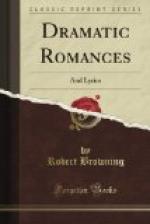Calmly he said that her lot was cast,
That the door she had passed was shut on her
Till the final catafalk repassed.
The world meanwhile, its noise and stir,
Through a certain window facing the East,
She could watch like a convent’s chronicler.
60
Since passing the door might lead to a feast
And a feast might lead to so much beside,
He, of many evils, chose the least.
“Freely I choose too,” said the bride—
“Your window and its world suffice,”
Replied the tongue, while the heart replied—
“If I spend the night with that devil twice,
May his window serve as my loop of hell
Whence a damned soul looks on paradise!
“I fly to the Duke who loves me well,
70
Sit by his side and laugh at sorrow!
Ere I count another ave-bell,
“’Tis only the coat of a page to borrow,
And tie my hair in a horse-boy’s trim,
And I save my soul—but not to-morrow”—
(She checked herself and her eye grew dim)
“My father tarries to bless my state:
I must keep it one day more for him.
“Is one day more so long to wait?
Moreover the Duke rides past, I know;
80
We shall see each other, sure as fate.”
She turned on her side and slept. Just so!
So we resolve on a thing and sleep:
So did the lady, ages ago.
That night the Duke said, “Dear or cheap
As the cost of this cup of bliss may prove
To body or soul, I will drain it deep.”
And on the morrow, bold with love,
He beckoned the bridegroom (close on call,
As his duty bade, by the Duke’s alcove)
90
And smiled, “’Twas a very funeral,
Your lady will think, this feast of ours,
A shame to efface, whate’er befall!
“What if we break from the Arno bowers,
And try if Petraja, cool and green,
Cure last night’s fault with this morning’s
flowers?”
The bridegroom, not a thought to be seen
On his steady brow and quiet mouth,
Said, “Too much favour for me so mean!
“But, alas! my lady leaves the South;
100
Each wind that comes from the Apennine
Is a menace to her tender youth:
“Nor a way exists, the wise opine,
If she quits her palace twice this year,
To avert the flower of life’s decline.”
Quoth the Duke, “A sage and a kindly fear.
Moreover Petraja is cold this spring:
Be our feast to-night as usual here!”
And then to himself—“Which night
shall bring
Thy bride to her lover’s embraces, fool—
110
Or I am the fool, and thou art the king!
“Yet my passion must wait a night, nor cool—
For to-night the Envoy arrives from France
Whose heart I unlock with thyself my tool.
“I need thee still and might miss perchance.
To-day is not wholly lost, beside,
With its hope of my lady’s countenance:




